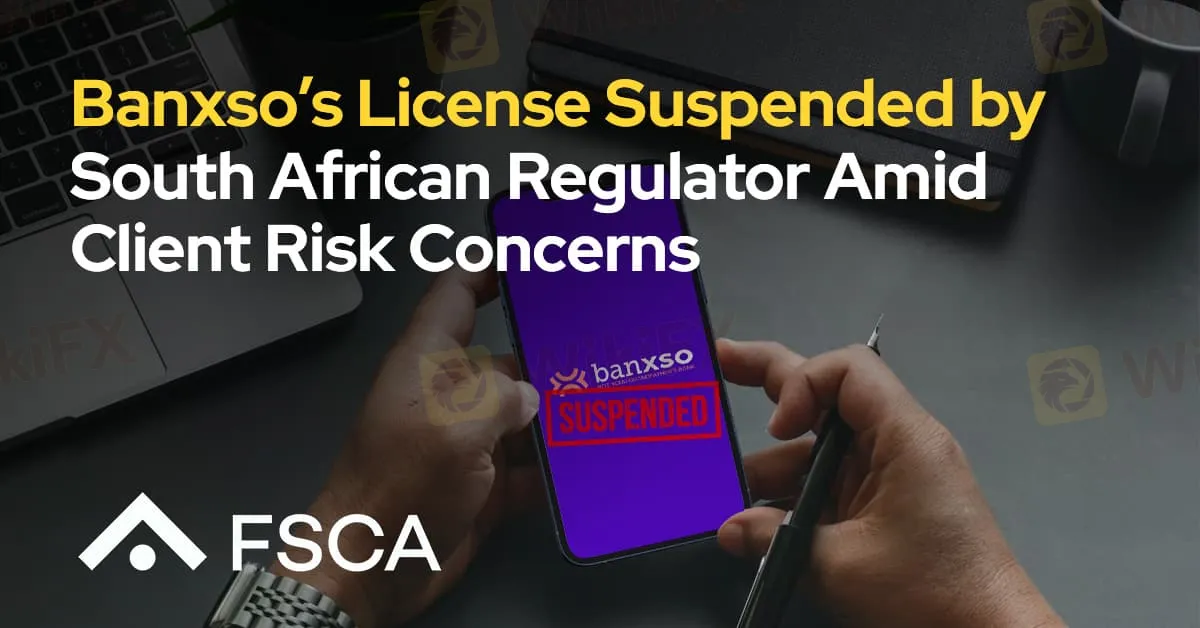简体中文
繁體中文
English
Pусский
日本語
ภาษาไทย
Tiếng Việt
Bahasa Indonesia
Español
हिन्दी
Filippiiniläinen
Français
Deutsch
Português
Türkçe
한국어
العربية
Banxso’s License Suspended by South African Regulator Amid Client Risk Concerns
Abstract:South Africa’s Financial Sector Conduct Authority (FSCA) has suspended the license of the online trading platform, Banxso.

South Africa‘s Financial Sector Conduct Authority (FSCA) has taken a decisive step in its regulatory oversight by withdrawing the operating license of the online trading platform Banxso. The move comes in response to growing concerns over the firm’s operational practices and the potential risks these pose to clients.
The FSCA cited several red flags in Banxso‘s operations, prompting the provisional suspension. Key among these concerns were reports linking the company to misleading deepfake advertisements and the aggressive sales tactics allegedly employed by its agents. These tactics reportedly pressured clients into making hasty investment decisions without a proper risk assessment or consideration of their financial needs, a clear breach of the regulator’s guidelines.
The FSCA emphasized that Banxso‘s license suspension is a temporary measure, pending a thorough investigation into the company’s activities. This action is intended to protect clients from potential harm while the regulator continues its inquiries. Banxso has been given the opportunity to respond to the allegations, and depending on the investigations findings, the decision to revoke the license could be reversed. However, the FSCA's initial findings suggest that the company's operations present significant ethical concerns and potential risks to clients.

In addition to the license withdrawal, the FSCA informed the Financial Intelligence Centre (FIC) of its concerns regarding Banxso‘s financial conduct. In response, on 2nd October 2024, the FIC placed a hold on seven of the brokerage’s bank accounts, citing the possibility of financial misconduct. Banxso subsequently challenged this action in the Western Cape High Court, seeking to overturn the decision. However, on 8th October, the court upheld the restrictions, refusing to lift the freeze on the accounts.
The situation escalated further on 14th October when South Africa‘s Asset Forfeiture Unit, part of the National Prosecuting Authority (NPA), secured a preservation order for the funds in Banxso’s accounts. This step underscores the gravity of the situation and suggests that the investigation may uncover more serious financial irregularities.
Despite the regulatory challenges in South Africa, Banxso continues to hold licenses in other jurisdictions. Earlier this year, the company was granted an Investment Dealer license by the Financial Services Commission in Mauritius. This license allows Banxso to offer a variety of financial products and services to its international clients in accordance with Mauritian regulatory standards.
As the FSCA continues its investigation, the outcome will likely shape the future of Banxsos operations within South Africa and possibly beyond. For now, the regulator remains firm in its commitment to ensuring that financial service providers operate with transparency and integrity, prioritizing the protection of clients and the broader public.

Disclaimer:
The views in this article only represent the author's personal views, and do not constitute investment advice on this platform. This platform does not guarantee the accuracy, completeness and timeliness of the information in the article, and will not be liable for any loss caused by the use of or reliance on the information in the article.
Read more

5 Risks associated with Grand Capital
You can avoid fraud, crypto scams, and similar traps simply by staying informed. If you regularly follow forex news, there’s a lower chance that you’ll fall victim to such scams. Being aware is the only way to stay safe. That’s why you also need to know about the Grand Capital broker and why it should avoided.

Exposed: Ibell Markets - A Scam Broker That Does Not Allow Withdrawals
Ibell Markets adds to the infamous list of scam brokers who think about acquiring customers and their investments. But what about the withdrawal? Do they allow? Read this to find out.

Avoid Trendify: 5 Red Flags Revealed
Trendify is nothing more than a scam broker. It is one of those forex brokers that acts genuine but is actually full of red flags. Before you invest and fall victim to its investment scam, its better to check out the risks involved with Trendify.

Forex Interbank Rate & How It Influences Your Trading
A forex interbank rate is nothing but the wholesale currency exchange rate that banks and other major financial institutions use to trade currencies among themselves. Read more about it.
WikiFX Broker
Latest News
Forex Hedging: Is It a Trader’s Safety Net or Just an Illusion?
OPEC+ members agree larger-than-expected oil production hike in August
FCA clarifies expectations on bullying, harassment and violence to deepen trust in financial service
Asia-Pacific markets mixed after Trump shifts goalposts on tariffs again
XS.com Expands Global Reach with Landmark Kuwait Launch
European markets set to open mixed amid fresh U.S. tariff threats
Top Wall Street analysts are pounding the table on these 3 stocks
Stock futures fall after Trump team says tariffs will go into effect on Aug. 1: Live updates
10 Unlicensed Brokers Exposed – Check Now to Stay Safe!
S&P 500 futures fall slightly as Trump threatens new tariffs, Tesla shares drop: Live updates
Currency Calculator


